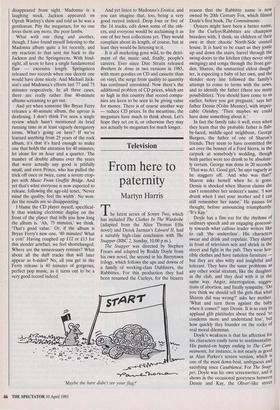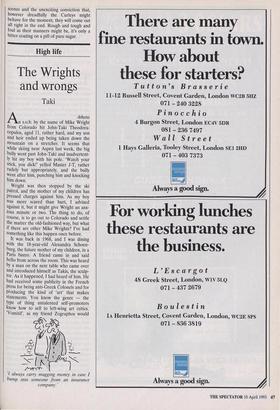Television
From here to paternity
Martyn Harris
The latest series of Screen Two, which has included The Clothes In The Wardrobe (adapted from the Alice Thomas Ellis novel) and Derek Jarman's Edward II, had a suitably high-class conclusion with The Snapper (BBC 2, Sunday, 10.00 p.m.).
The Snapper was directed by Stephen Frears and adapted by Roddy Doyle from his own novel, the second in his Barrytown trilogy, which follows the ups and downs of a family of working-class Dubliners, the Rabbittes. For this production they had been renamed the Curleys, for the bizarre 'Maybe the hare didn't see your flag?' reason that the Rabbitte name is now owned by 20th Century Fox, which filmed Doyle's first book, The Commitments.
Oysters might have been a better name, for the Curleys/Rabbittes are champion breeders with, I think, six children of their own in their chaotic North-Side council house. It is hard to be exact as they jostle up and down the stairs, barrel through the swing-doors to the kitchen (they never stop swinging) and conga through the front gar- den. Sharon, the unmarried eldest daugh- ter, is expecting a baby of her own, and the slender story line followed the family's attempt to come to terms with the news, and to identify the father (there are many possibilities). 'You should have come to us earlier, before you got pregnant,' says her father Dessie (Colm Meaney), with impec- cable Oirishry. 'Then maybes we could have done something about it.'
In fact the family take it well, even when they learn that the probable father is flab- by-faced, middle-aged neighbour, George Burgess, the father of one of Sharon's friends. They seem to have committed the act over the bonnet of a Ford Sierra, in the carpark at somebody's wedding, though both parties were too drunk to be absolute- ly certain. George was done in 20 seconds: 'That was Al. Good girl,' he says vaguely as he staggers off. 'And who was that?' Sharon asks herself when he is gone. Dessie is shocked when Sharon claims she can't remember her seducer's name. 'I was drunk when I met your mother and I can still remember her name.' He pauses for thought, before announcing triumphantly. 'It's Kay.' Doyle has a fine ear for the rhythms of ordinary speech and an engaging generosi- ty towards what callous leader writers like to call 'the underclass'. His characters swear and drink and copulate. They slump in front of television sets and shriek in the street and fight in the pub. They wear hor- rible clothes and have tasteless furniture — but they are also witty and insightful and tolerant. They have the same problems as any other social stratum, like the daughter in the club, and they deal with it in the same way. Anger, interrogation, sugges- tions of abortion, and finally sympathy. 'Do you think we should tell the girls that what Sharon did was wrong?' asks her mother. 'What and turn them against the baby when it comes?' says Dessie. It is so easy to applaud glib platitudes about the need `to condemn more and understand less', but how quickly they founder on the rocks of real moral dilemmas.
Doyle's weakness is that his affection for his characters easily turns to sentimentality. His pasted-on happy ending to The Com- mitments, for instance, is not nearly as good as Alan Parker's screen version, which is one of the most down-beat, ambiguous and satisfying since Casablanca. For The Snap- per, Doyle was his own screenwriter, and it shows in the occasional gooeyness between Dessie and Kay, the Oliver!-like street
scenes and the unexciting conviction that, however dreadfully the Curleys might behave for the moment, they will come out all right in the end. Rough and tough and foul as their manners might be, it's only a bitter coating on a pill of pure sugar.



























































 Previous page
Previous page